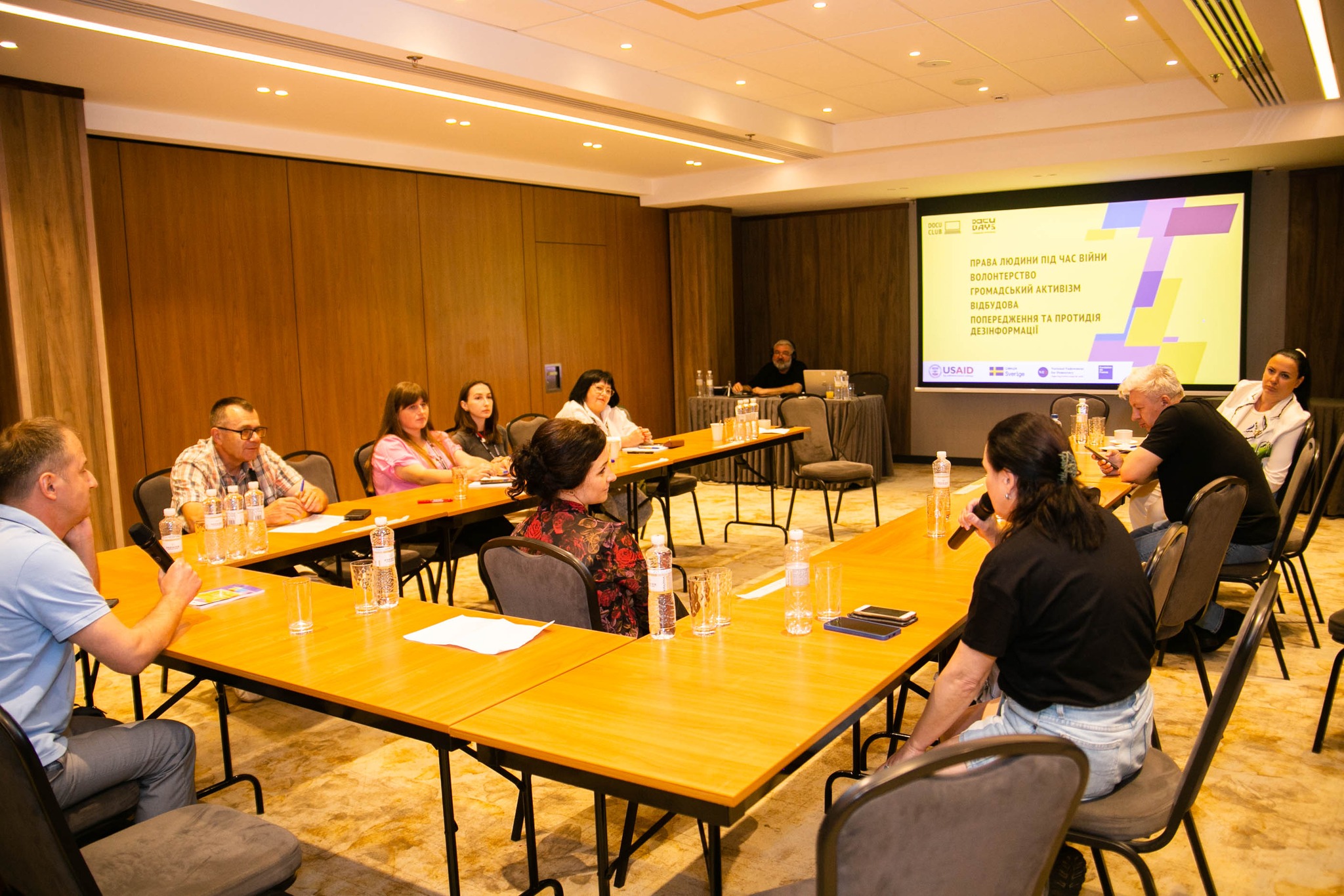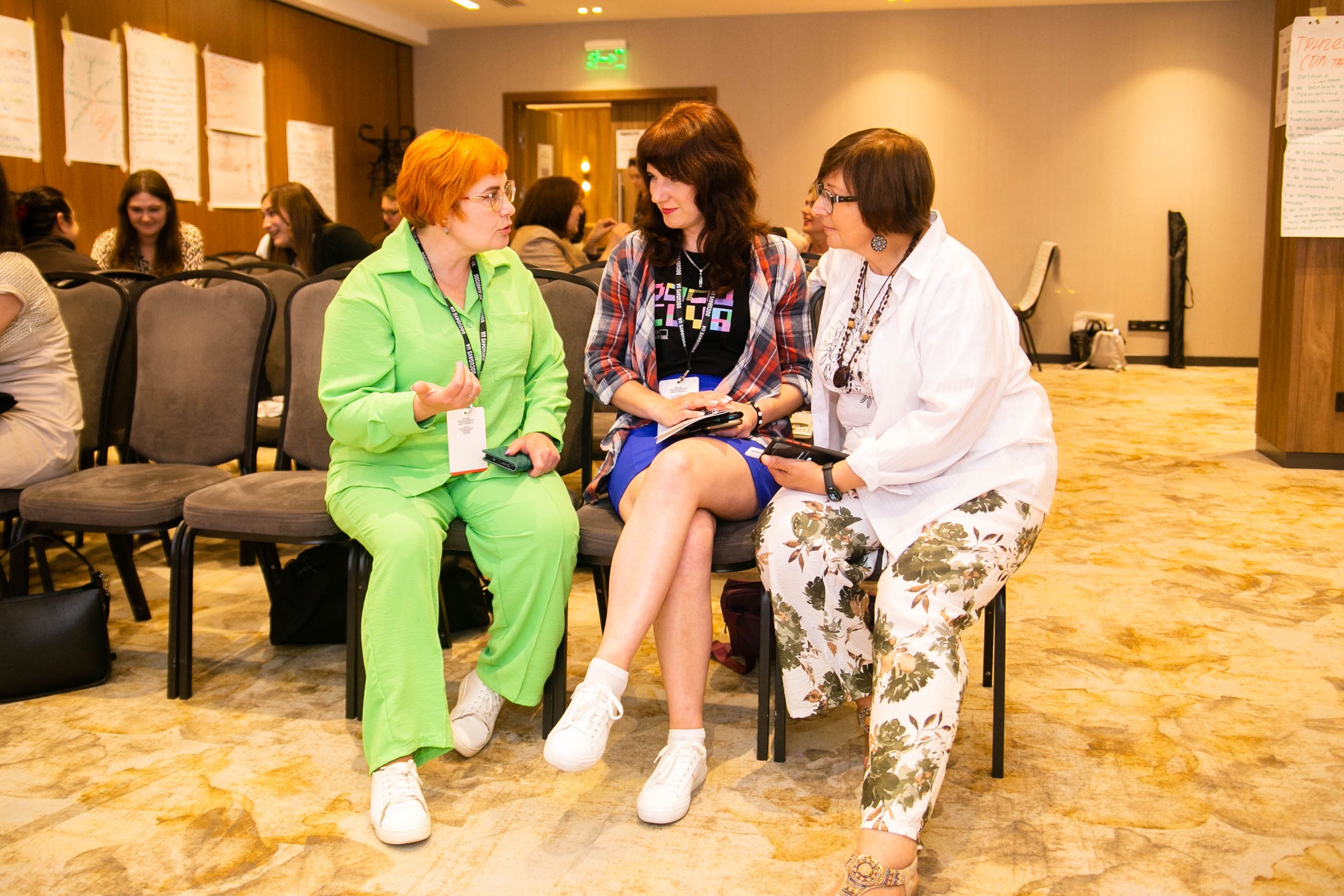
This year, the DOCU/CLUB Network team conducted focus group surveys to collect feedback from moderators and viewers about the Network's activities. We are now sharing the results of this survey.
The team was tasked with monitoring the change in the attitudes of film club audiences to certain topics (human rights during the war, volunteering, civic activism, reconstruction, prevention and countering of disinformation), as well as the perception of the Network's products by the audience. In total, four focus groups were held during the study: two with moderators and two with viewers. Most participants of the moderators’ group work at various NGOs, from educational or children's organizations to community development associations. In addition, these moderators represent film clubs at libraries and other community organizations. The participants of the audience groups have realized themselves in the fields of education, art, librarianship, IT, journalism, and foreign philologies. One of the participants is a member of the military. IMPORTANCE OF THE DOCUDAYS UA FILM CLUBS AS COMMUNITY SPACES The film club moderators noted that film clubs are spaces for community cohesion and education that provide a safe human rights environment and a friendly space for free communication between parents and their children – in short, film clubs are spaces where society emerges.
Photo from the moderators’ conference For the audience, film clubs are a platform for learning, professional growth, generating change, and leisure. IMPACT OF FILM CLUBS’ ACTIVITIES Moderators believe that film clubs influence the audience's awareness about human rights, draw attention to the concept of human dignity, promote personal development and understanding of universal values, and form critical thinking. In their opinion, film clubs have an impact on the group cohesion and integration of children, as well as help re-socialize and reform criminally convicted people. Participants of the audience’s focus groups emphasized that film clubs increase their involvement in community life. Film clubs create communities of like-minded people and help internally displaced persons integrate into their new communities. In addition, viewers recognize the impact of film clubs on changing their attitudes or strengthening their beliefs. THEMES OF FILM CLUB MEETINGS Moderators identified the topics that resonate the most with their audience. These included environmental protection, combating violence, language, volunteering, civic activism, internal migration, and human rights in times of war. Meanwhile, the audience have their version of the most interesting topics: war, resistance and the struggle for independence, activism, combating corruption, communication between generations, and art. INTERACTION OF MODERATORS WITH THE AUDIENCE For moderators to work confidently with the audience, expertise, experience in volunteering and activism, and involvement in prominent local NGOs are crucial. Mental flexibility and the ability to prepare the audience for the screening are also important. Moderators point out that inclusiveness, safety, and openness of film club spaces are keys to successful screenings and discussions. 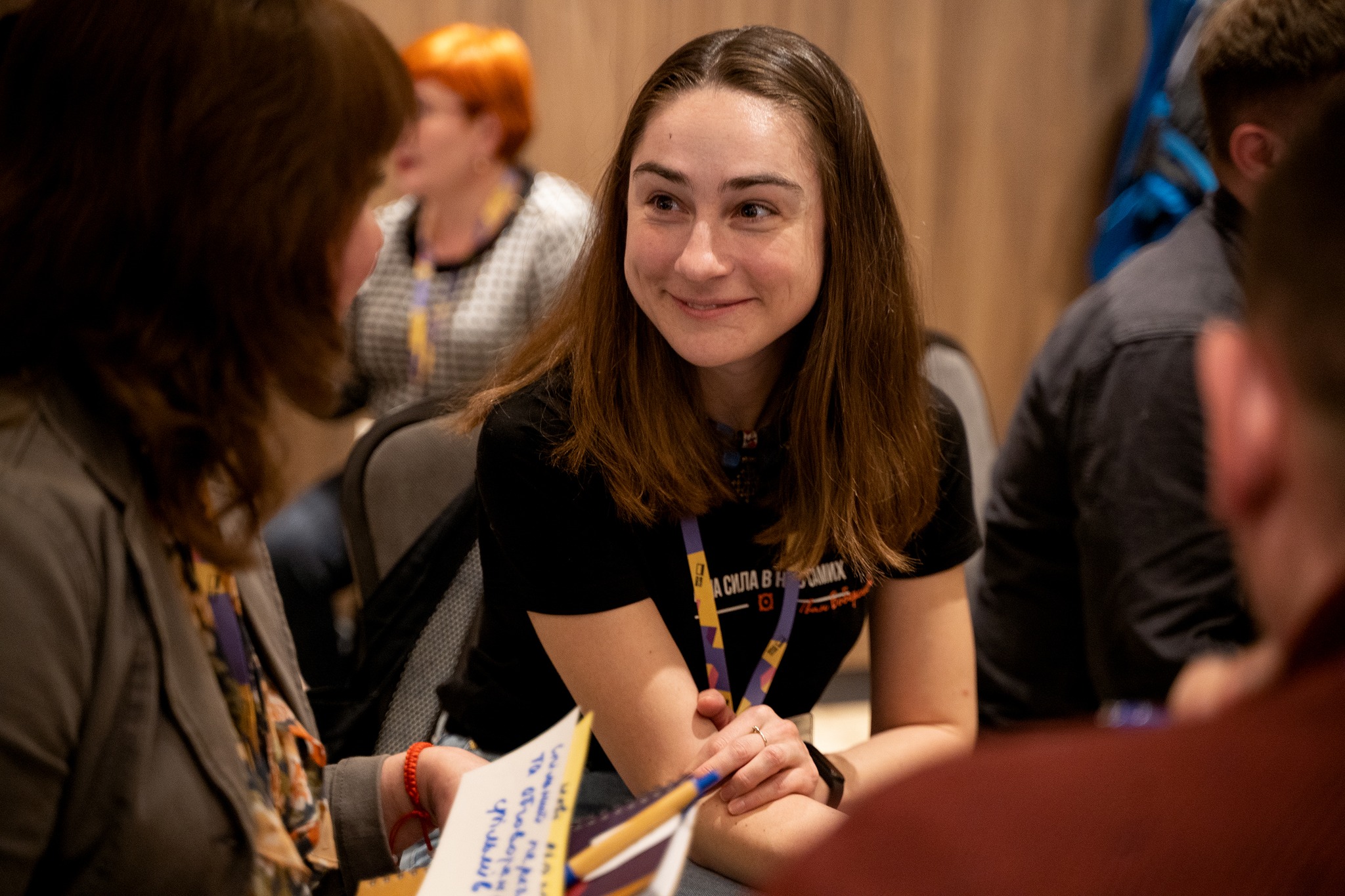
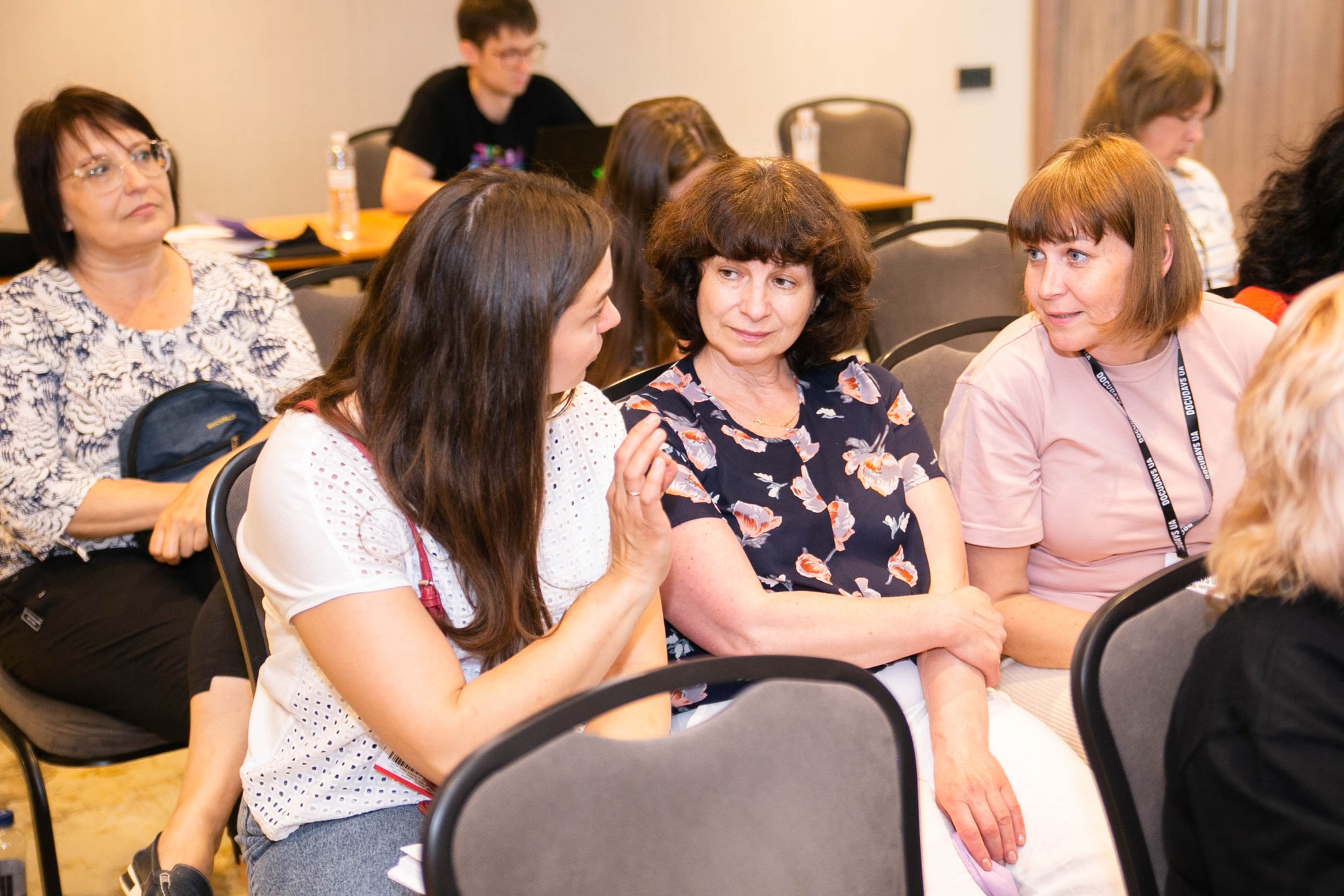
Photo from the moderators' conference Viewers also point out that the safety of the space is one of the most important factors for them visiting a film club. They value the atmosphere in a film club and the opportunities for open, safe, and comfortable communication. INDICATORS OF IMPACT ON THE AUDIENCE Moderators identified a number of factors that indicate the effectiveness of interaction with the audience, a deep impact on the viewers, and changes in their involvement in the film club community after the screening. These include personal, professional, and activist growth of the audience, increased activism among young people, and projects initiated by film club members. Impact indicators include the audience's desire to consult with the experts on the topic of the event and invitations from moderators to hold a screening for another audience or in another community. It was also noted that the absence of recidivism (repeated crimes and/or offenses) is an indicator of change for the community of convicts.
Another important indicator of successful interaction with and influence on the audience is networking, which implies formation of a core of viewers and initiative groups that open new clubs in remote communities, join volunteer initiatives, and create their own civil society organizations. Indirect, but no less important, indicators of impact for moderators are viewers’ recommendations to their friends and acquaintances to attend a film screening and positive dynamics of the film club's social media followers (e.g. Facebook pages). SPREADING INFORMATION ABOUT FILM CLUBS AND INCREASING THE NUMBER OF VIEWERS The research results showed that moderators mostly use two methods to promote their activities and inform the public about film club events: verbal announcements at local institutions or via communities and use of closed groups on social media, e.g. those of libraries, NGOs, and apps to inform about cultural events. 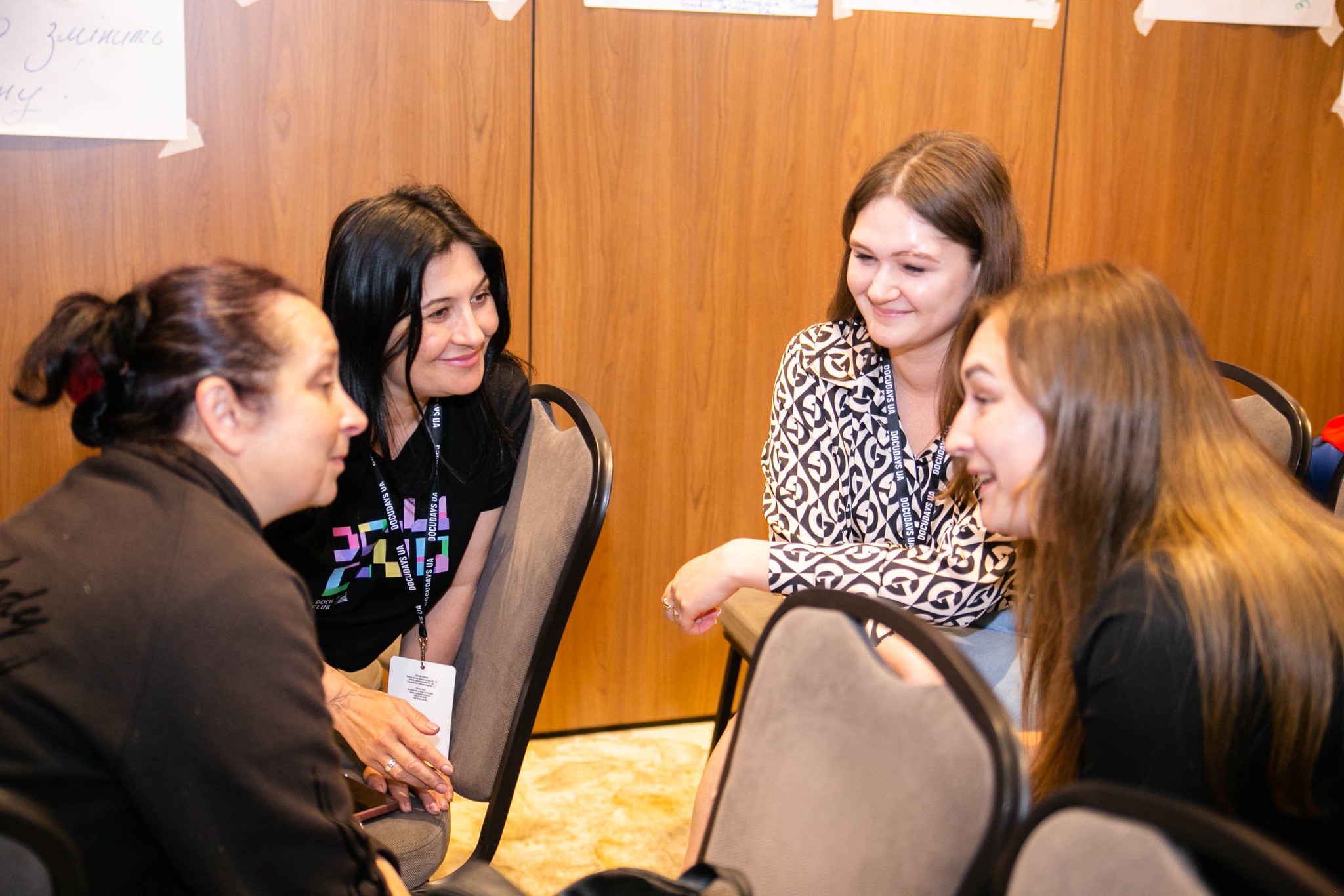 Photo from the moderators’ conference
Photo from the moderators’ conference
Focus group surveys Participants of the audience groups emphasized the need to more actively cover the activities of film clubs and announce events on social media pages, and suggested using the channels of government agencies. They also suggested that moderators should interact with local festivals, public and mass events, and disseminate information through them. EXPECTATIONS AND REQUESTS During the focus groups, moderators voiced the need for additional information and in-depth training. Some of their requests are related to communication and audience management skills: effective discussion practices, ability to moderate difficult discussions and resolve conflict situations. Moderators want to learn how to interact with heterogeneous, broad circles, develop social cohesion, and work with polarized audiences. There are also requests for in-depth training on human rights and information about socially sensitive topics. Moderators need training on various specialized issues (e.g., combating sexual violence), as well as more training sessions on stereotypes, prejudice, and intolerance towards the LGBTQ+ community. Photo from the moderators’ conference The moderators initiate joint screenings and discussions of new films in a narrow circle of moderators and experts, as they believe this effectively improves the quality of the film clubs' work. The participants of the audience research voiced their wish for expanding the range of topics of film club events. These include deeper coverage of the topic of rehabilitation and recovery of veterans, an increase in the number of films about topics related to history and art, and screenings of films about life in other countries. Regarding the organization of events in film clubs, the audience asks for more involvement of filmmakers and protagonists in discussions, emphasizing the need to strengthen psychological assistance provided to the audience by moderators. The DOCU/CLUB Network team thanks all the participants of the focus groups for taking part in the survey. We are confident that the results will ensure quality growth of our community. Photo: Dmytro Shatskyi The development of the DOCU/CLUB Network is funded by the United States Agency for International Development (USAID), the Embassy of Sweden in Ukraine, the National Endowment for Democracy (NED) and Fondation de France. The opinions, conclusions, or recommendations are those of the authors and compilers of this publication and do not necessarily reflect the views of the governments or charitable organizations of these countries. The authors and compilers are solely responsible for the content of this publication.